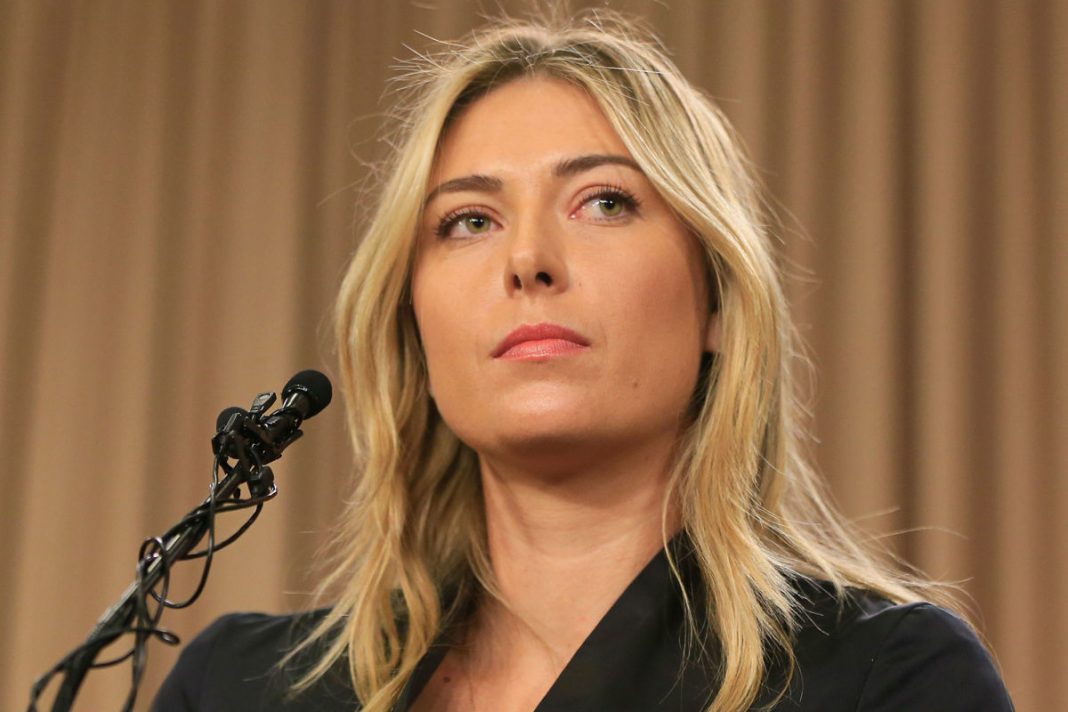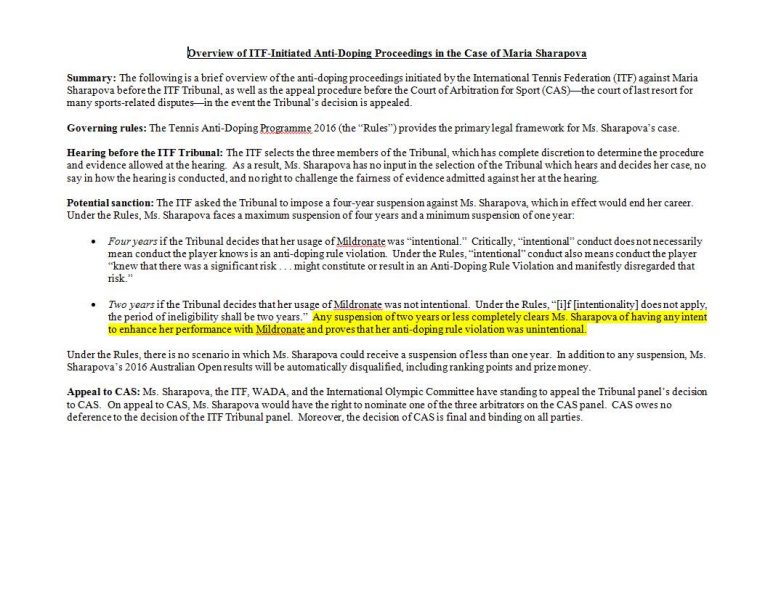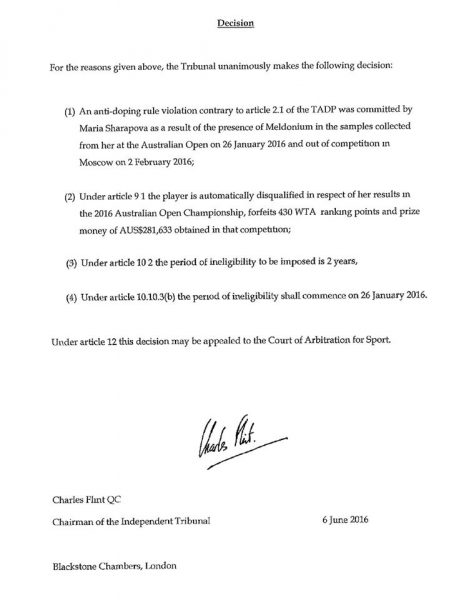
On Wednesday, more than three months after we first learned about Maria Sharapova’s doping violation, the International Tennis Federation (ITF) made their ruling involving the case. Sharapova, pending appeal, will not be eligible for tennis competition on the WTA circuit until January 26th, 2018.
For a quick background, Sharapova had used the banned substance mildronate, which also goes by the name meldonium, over the long term. However, at the time of her violation, it had only recently become banned (i.e.,. on January 1st, 2016).
Sharapova played in the 2016 Australian Open, but on March 7th, she revealed that she’d failed a drugs test at Melbourne Park.
“I received a letter from the ITF that I failed a drugs test at the Australian Open. I take full responsibility for it. For the past ten years I have been given a medicine called mildronate by my family doctor and a few days ago after I received the ITF letter I found out that it also has another name of meldonium which I did not know. It is very important for you to understand that for ten years this medicine was not on WADA’s banned list, and I had legally been taking the medicine for the past ten years. But on January 1st [2016] the rules had changed, and meldonium became a prohibited substance which I had not known.”
Nonetheless, the developments resulted in the two-year ban that was announced on June 8th.
Shortly after the announcement of the ban, Sharapova made it clear that it could be logically deduced that the ITF had also in effect acknowledged that she did not intentionally take a drug to enhance her performance – something that differentiates her from scores and scores of other athletes of modern times. Citing a document titled “Overview of ITF-Initiated Anti-Doping Proceedings in the Case of Maria Sharapova,at” the Russian highlighted a statement in that documenon her Facebook page. That statement reads:
“Any suspension of two years or less completely clears Ms. Sharapova of having any intent to enhance her performance with Mildronate and proves that her anti-doping rule violation was unintentional.”
That said, tennis players are responsible for keeping up with what is banned and what is not and, for this accidental oversight, it’s clear that some responsibility should rest with Sharapova. On that matter, she has not ducked away.
Sharapova had this to say on her page:
Today with their decision of a two year suspension, the ITF tribunal unanimously concluded that what I did was not intentional. The tribunal found that I did not seek treatment from my doctor for the purpose of obtaining a performance enhancing substance. The ITF spent tremendous amounts of time and resources trying to prove I intentionally violated the anti-doping rules and the tribunal concluded I did not. You need to know that the ITF asked the tribunal to suspend me for four years – the required suspension for an intentional violation — and the tribunal rejected the ITF’s position.
While the tribunal concluded correctly that I did not intentionally violate the anti-doping rules, I cannot accept an unfairly harsh two-year suspension. The tribunal, whose members were selected by the ITF, agreed that I did not do anything intentionally wrong, yet they seek to keep me from playing tennis for two years. I will immediately appeal the suspension portion of this ruling to CAS, the Court of Arbitration for Sport.
I have missed playing tennis and I have missed my amazing fans, who are the best and most loyal fans in the world. I have read your letters. I have read your social media posts and your love and support has gotten me through these tough days. I intend to stand for what I believe is right and that’s why I will fight to be back on the tennis court as soon as possible.
Love, Maria
P.S. My lawyer prepared a short summary of how the ITF process works so I thought I would pass it along to my fans so you too can be aware of what the ITF rules call for
Steve Simon, the WTA CEO, issued a safe statement following the decision to ban Sharapova for the maximum amount of time possible:
“It is important at all times for players to be aware of the rules and to follow them. In this case, Maria has taken responsibility for her mistake from the outset. The WTA supports the process that the ITF and Maria have followed. The ITF has made its ruling and, under the Tennis Anti-Doping Program, the decision may be appealed to the Court Arbitration for Sport. The WTA will continue to follow this closely, nd we hope it will be resolved as soon as possible.”
Sharapova’s statement was far more critical of the decision: “While the tribunal concluded correctly that I did not intentionally violate the anti-doping rules, I cannot accept an unfairly harsh two-year suspension. The tribunal, whose members were selected by the ITF, agreed that I did not do anything intentionally wrong, yet they seek to keep me from playing tennis for two years. I will immediately appeal the suspension portion of this ruling to CAS, the Court of Arbitration for Sport.”
The two-year suspension is entirely out of order in my opinion. Firstly, the length of time that she used the substance, as a banned substance, is minimal. Secondly, there’s a bit of a trap here: it’s like a sheriff lowered the speed limit sign overnight in a stretch of highway and then issued the maximum fine to the violators when a reasonable person might be more inclined to issue a warning or a slap-on-the-wrist instead.
The two-year suspension may actually be a tactic that is commonly used in situations where there are appeal processes. Two years is the maximum length that the ITF was capable of issuing, thereby setting the negotiating point at the highest point ahead of the appeal process. Arguably, for what Sharapova did she should already be back on tour with a three-month suspension more than lengthy enough for what was accidental usage according to facts shared by both sides of the issue.
A question that I can’t get over is why the ITF would want to suspend Sharapova for the lengthiest possible amount of time given her history, her forthcomingness, and the fact that her usage of a banned substance was limited in time frame. One possible reason is to send a message that rules are rules and they are meant to be followed and not overlooked even by accident. That message certainly gets across, however what also gets across is that a clean history prior to one mistake, being forthcoming, and breaking the rules for a very short time is all irrelevant too.
I have wondered if Sharapova’s involvement over the years on the issue of equal pay in tennis has had any effect on her treatment. In 2012, for example, she butted heads with Gilles Simon on the issue. The ITF doesn’t govern over just women’s tennis but all of tennis. That could lead to some partiality if there’s a belief that the men’s side of things is more important.
That doesn’t mean that I think she has been, for lack of a better word, criminalized over the banned substance usage. However, she is the most successful female athlete of our time in terms of income. That makes her a stand out against the norm and perhaps that’s drawn some undeserved scorn her way. That scorn might serve to maximize her punishment instead of just letting something fair happen. It’s really strange that she gets the maximum punishment allowed given how open she was, given it was her first offense, and given that her usage time of the substance – as a banned substance – was incredibly minimal.
The minimum suspension that she could receive is one year. However, I think in a fair world someone who failed a drug test shortly after a drug became illegal would really only get a month and a fine, provided it was a first-time offense.





